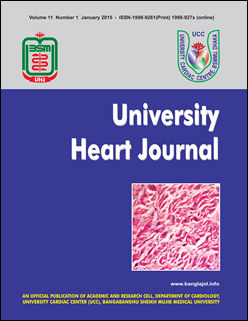A Study of N-terminal pro-Brain Natriuretic Peptide as a Predictor of Adverse Outcome of STEMI
DOI:
https://doi.org/10.3329/uhj.v11i1.27594Keywords:
STEMI, NT- pro BNPAbstract
Background: Mortality risk is quite variable among fibrinolytic treated ST elevation myocardial infarction patients. Careful and early risk evaluation of each patient is therefore important. Until now, the most evaluated biomarker has been troponin I on admission, which gives strong prognostic information. NT pro BNP has shown reasonable promise in predicting the adverse outcome of STEMI. This research will provide the information regarding its efficacy as a predictor of adverse outcome following STEMI. Objective: To assess the prognostic value of N-terminal pro-brain natriuretic peptide in fibrinolytic treated ST elevation myocardial infarction (STEMI) patients. Method: This short term prospective study was done in Cardiology dept. of BSMMU. We valuated 115 patients of STEMI admitted within 12 hours and receiving thrombolytic therapy. Venous blood sample was collected for NT pro BNP before starting fibrinolytic therapy. Additional clinical data was recorded including detailed complications of STEMI. Results: Out of 115 patients of STEMI 32.2% patient had adverse outcome among them 9.6% patients died, heart failure 13.0%, cardiogenic shock 7.8%, VT & VF 5.2%, acute MR 2.6%, VSR 0.9%, CHB 2.6% and 67.8% patient had no adverse outcome. According to association between hospital outcomes with N-terminal pro BNP level, it was observed that the mean Nterminal pro BNP level was higher in adverse outcome group. Based on the receiver-operator characteristic (ROC) curves N-Terminal Pro BNP level gave a cut off value ?480.0 pg/ml, with 88.5% sensitivity and 100.0% specificity for prediction of complications and similarly N-terminal pro BNP level gave a cut off value ?725.5 pg/ml, with 72.7% sensitivity and 93.3% specificity for prediction of mortality. Conclusion: N-Terminal Pro BNP level was highly sensitive and very much effective in the evaluation of adverse outcome of fibrinolytic treated ST elevation myocardial infarction (STEMI).
University Heart Journal Vol. 11, No. 1, January 2015; 13-17
Downloads
206
244




